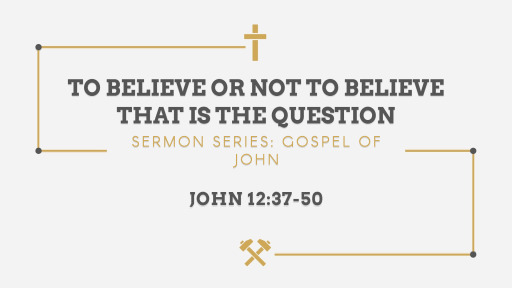TO BELIEVE OR NOT TO BELIEVE THAT IS THE QUESTION

Notes
Transcript
Sermon Tone Analysis
A
D
F
J
S
Emotion
A
C
T
Language
O
C
E
A
E
Social
The second Discourse (12:37–50)
(1) The prophecy (12:37–41): Jesus tells the Jewish crowd their unbelief was prophesied centuries before by Isaiah (; ).
Teleological plan of God meaning that prophecy is interwoven and infused with the absolute plan of God. Gods Word is not just correlational with human history it is causational. Gods Prophetic word is guiding history towards a determined end, not just merely serving as a predictive guide to of a random chance of events. The end time events Prophesied in the Apocalyptic book Revelation make that clear. The prophesies in Revelation will be absolutely fulfilled not because God can see the future but according scripture God is the author and perfecter or our faith. The one who calls things not as though they were, who determines the end from the beginning.
Concerning Biblical Sovereignty as it relates to Prophesy
God knows every decision a person could or would make, not because he sees the future, but because in his creative act he knows intimately all of his creation and their limits. These limits are set by God an are an intimate part of Gods knowing in an absolute perfect since, so that all actions from before the creation of the world are known. God doesn’t have to manipulate every single action, but every single action has been considered and accounted for before the creation of the world. His actions and decisions and how he works in creation making decisions according to the purpose of his will are his alone. Where he will, he wills, if he wants to reveal his will he does so by scripture and in history but where he does not no one can say what God has absolutely done or hasn’t done one way or the other.
If prophetic history aka prophesy is not predicated strictly according to God’s power and will alone, then there is no absolute mathematical certainty that what God decrees or reveals through his word will or can absolutely come to pass.
Rev 13:8: 17:8
(2) The praise seekers (12:42–43): Some Jewish leaders believe Jesus is the Messiah but will not confess him, for they love men’s praise more than God’s praise.
· Matt Parable of the seed and soil.
(3) The promise (12:44–50): To accept Christ is to accept the Father, which leads to life everlasting.[1]
· There is no true relationship with God the Father outside of Jesus Christ
· Our relationship with Christ through his Word (knowing & obeying) speaks to our relationship with the father
